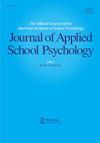学校心理学家在幼儿时期的作用真的在扩大吗?全国学校心理学家实践与培训经验调查
IF 1.5
Q4 PSYCHOLOGY, EDUCATIONAL
引用次数: 16
摘要
摘要从历史上看,根据《残疾人教育法》B部分,学校心理学家在幼儿环境中的作用仅限于识别和评估可能需要特殊教育服务的儿童。有人建议,这种作用应反映出一种更加积极主动的模式;具体来说,它应该继续扩大,包括参与学校准备和所有学生的早期干预。本研究的目的是检验学校心理学家在幼儿环境中的作用,并调查为学校心理学研究生提供的研究生水平培训。调查结果发现,相当大比例的学校心理学家继续将相当大一部分专业时间用于完成特殊教育评估。此外,答复者报告说,在幼儿人口领域接受了最低至中等程度的研究生培训。讨论了对学校心理学从业者和学校心理学研究生培养计划的启示。本文章由计算机程序翻译,如有差异,请以英文原文为准。
Is the Role of the School Psychologist in Early Childhood Truly Expanding? A National Survey Examining School Psychologists' Practices and Training Experiences
ABSTRACT Historically, the role of school psychologists in early childhood settings has been limited to the identification and evaluation of children who may be in need of special education services under Part B of the Individuals with Disabilities Education Act. It has been suggested that the role should reflect a more proactive model; specifically, it should continue to expand to include involvement in school readiness and early intervention for all students. The purpose of this study was to examine the present role of school psychologists in early childhood settings and investigate the graduate-level training provided to school psychology graduate students. Results of the survey found that a significant percentage of school psychologist practitioners continue to spend a substantial portion of their professional time completing special education evaluations. Furthermore, respondents reported minimal to moderate graduate training in the area of early childhood populations. Implications for school psychology practitioners and school psychology graduate training programs are discussed.
求助全文
通过发布文献求助,成功后即可免费获取论文全文。
去求助
来源期刊

Journal of Applied School Psychology
PSYCHOLOGY, EDUCATIONAL-
CiteScore
2.40
自引率
10.00%
发文量
7
期刊介绍:
With a new publisher (Taylor & Francis) and a new editor (David L. Wodrich), the Journal of Applied School Psychology will continue to publish articles and periodic thematic issues in 2009. Each submission should rest on either solid theoretical or empirical support and provide information that can be used in applied school settings, related educational systems, or community locations in which practitioners work. Manuscripts appropriate for publication in the journal will reflect psychological applications that pertain to individual students, groups of students, teachers, parents, and administrators. The journal also seeks, over time, novel and creative ways in which to disseminate information about practically sound and empirically supported school psychology practice.
 求助内容:
求助内容: 应助结果提醒方式:
应助结果提醒方式:


